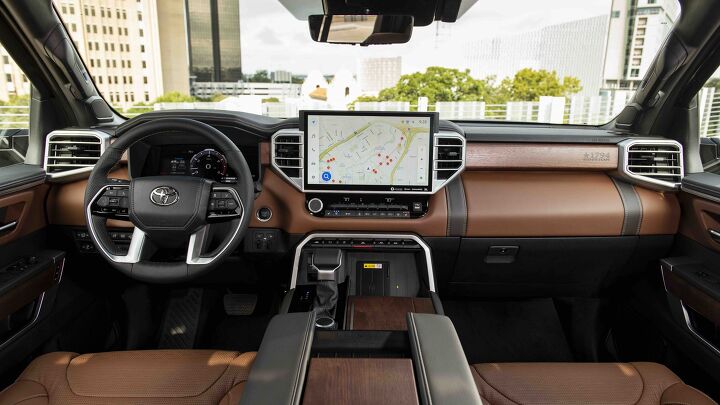#DataPrivacy
Toyota Japan Admits to Exposing Millions of Customers' Data to the Open Internet for Years
Toyota was far behind the times when it came to Apple CarPlay and Android Auto, with some at the company citing concerns around owners’ privacy as a significant speedbump to implementing the tech. Now, it seems those concerns didn’t completely extend to other areas of the automaker’s business. It recently apologized for leaving millions of owners’ data on the internet for several years.
Automakers Claim They Can’t Comply With Right-to-Repair Laws
The State of Massachusetts' Right-to-Repair law was passed in 2012, laying the foundation for the rest of the United States to begin securing consumer protections that would allow them to work on the products they own. General Motors and Stellantis are now claiming they cannot possibly adhere to the rules and have done nothing to prepare for complying with the law.
Driving Dystopia: German Automakers Keep Reimagining Vehicle 'Ownership'
Volkswagen recently announced that it plans on making massive amounts of money by introducing more vehicles with over-the-air updates (OTAs), many of which will be able to store and transfer personal profiles so that users can effectively just rent their vehicles for eternity. Additionally, VW has suggested future models will have ability to lock features (that have already been physically installed) behind a paywall that users can unlock via subscription services — things like heated seats, satellite navigation, or even the vehicles top speed.
“In the future, our customers will buy, lease, share or rent cars just for a weekend, and we can use software to provide them with whatever they need over the air,” VW brand’s sales chief Klaus Zellmer said during an online presentation held on Tuesday. “The ID family has been designed for further development, with OTA updates to improve the software’s performance and tailor it to our customers’ needs.”
Going Android: Ford and Google Enter Six-year Data Partnership
On Monday, Ford and Google jointly announced a strategic, six-year partnership to accelerate the automaker’s connected vehicle and data service programs. Framed as part of Ford’s natural evolution into an information focused mobility firm, the release was loaded with corporate buzz phrases that we had to clean up. But the gist is that Ford would like to leverage Google Cloud for its products, meaning all future Ford models will be running Android operating systems starting in 2023.
This clears a pathway for improved integration from Google Assistant, Maps, Play, or any third-party applications catering to the incredibly popular OS. Unfortunately, it also highlights how gaga automakers are getting about data for the umpteenth time.
BMW Taps Amazon Cloud Computing for Data Lair [Updated]
On Tuesday, BMW announced it would be partnering with Amazon Web Services (AWS) to develop a cloud-based IT solution allowing it to integrate data and analytics into literally every aspect of the business “from vehicle development to after-sales services.” The automaker said data will now be shifted around liberally between business units and operations in over a hundred countries to help create a more fluid and responsive way of doing business. BMW to hire and train up to 5,000 software engineers in the latest Amazon tech to “empower” its workforce to manage the data.
Though some of that will be handled independently by artificial intelligence. Along with the physical construction of the necessary data hub, the company plans on certifying roughly 2,000 in machine learning and data analysis. If that sounds a bit technical and vague, just imagine BMW building Skynet from the Terminator films and actually getting some decent work out of it before it decided to exterminate humanity.
Uber Offering COVID-19 Contract Tracing Data to Government Entities
Uber Technologies Inc. has kicked off a new service that provides public health officials immediate access to data on drivers and riders who may have been in contact with someone infected with COVID-19. Weirdly, the company decided against announcing the sharing of your whereabouts with the government with any fanfare. Perhaps they thought average people wouldn’t be interested, or maybe that broadcasting their own participatory role in crafting a nightmare dystopia could be bad for business.
Then again, maybe this is exactly the kind of mass surveillance we need to flatten the curve, stop the spread, or whatever slogan is currently the trendiest. Worried? Don’t be. Uber said this service will be offered free of charge, meaning you don’t even have to spend any additional money to have your information shared.
What a sweet deal!
Fiat Chrysler Cracks Down on Data Violators After Ram/Jeep Theft Ring Bust
A Houston-area vehicle-theft ring that used laptops to enter, then steal, over 100 Jeep and Ram vehicles exposed a serious internal security breach at Fiat Chrysler Automobiles.
Now that two arrests have been made in the case, FCA is talking tough and threatening criminal proceedings against anyone who provides outsiders with key vehicle data, Automotive News reports.
Attention: Password Reset Sufferers
Ever since a data breach left user accounts vulnerable to attack a couple of months ago, VerticalScope has been going through each one of its properties and resetting user passwords.
Normally, this reset would result in an email being sent to the user notifying them of that fact. However, some of our more prolific members have decided to provide email addresses that simply don’t exist.
I’m here to help.
If you’d like to access your commenter account once again, here’s what to do:
Phoenix Suburb Installing License Plate Readers To Thwart Rare Burglary Activity
Police in Paradise Valley, Arizona are planning to install 15 license plate readers to aid in thwarting burglaries in the Phoenix suburb.
Zetsche: Google Better Off As Supplier Than As Automaker
Google may have the right stuff to shake up the auto industry, but Dr. Z doesn’t believe the tech giant will ever be an automaker in its own right.
US Data Privacy Guidelines Not Compatible With Euro Privacy Laws
Just as with emissions and headlamps, standards recently adopted in the United States regarding consumer data and privacy won’t be compatible elsewhere, specifically in Europe.
Privacy Advocates Take Law Enforcement To Task Over Handling Of License Plate Data
The panopticon grows taller every day, as motorists who try to learn what information is gathered by the automatic license plate readers face roadblock after roadblock, with three cases set to determine once and for all what can be seen.
Metaxas: License Plate Recognition Can Improve Originations
Aside from GPS-equipped starter interrupt systems, lenders have another tool to repossess a vehicle, with the added benefit of using the data obtained to acquire better contracts: license plate recognition.
Lenders Monitor, Control Subprime Nexum Via Connected Vehicle Tech
In a perverse nexus where connected-vehicle technology, privacy and subprime lending intersect, consumers who fall behind on so much as a single payment, or even stray outside a given teritory, may find their vehicles shutdown by their lender from a digital panopticon.
Privacy Concerns By Auto Lenders Shape SEC Asset-Backed Security Rule
It took four years, but the Securities and Exchange Commission has put the final touches on a rule regarding asset-backed securities — including auto loans and leases — and what information is given when a company or investor takes on an ABS.







![BMW Taps Amazon Cloud Computing for Data Lair [Updated]](https://cdn-fastly.thetruthaboutcars.com/media/2022/07/19/9162722/bmw-taps-amazon-cloud-computing-for-data-lair-updated.jpg?size=720x845&nocrop=1)






















Recent Comments